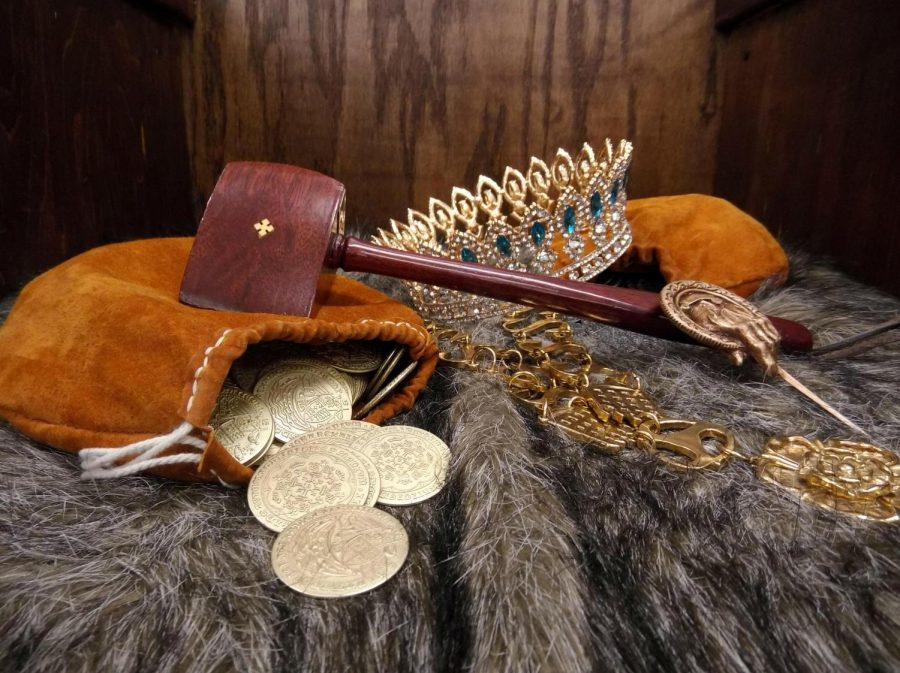The Game of Thrones–At ACC
In the game of thrones, you win or you die… or you miss out on extra credit points.
Image via Kera Morris
Signs of office and import; a queen’s crown, a Regent’s sigul, the chain and gavel of a Chancellor…
Drama. Romance. The whims and petty desires of the rich and powerful. Politics. Intrigue, back-stabbings, whispered plans of assassination. A fight to the death to control the throne, the crown, a boy King.
“I love Game of Thrones!” you’ve now probably said to the screen. Or maybe even “Ugh, I hate Game of Thrones, it’s so overrated.” It’s cool. We all talk to ourselves. (And some of us are hipsters who can’t admit to liking popular things, even to ourselves.)
But what if you could be the one ruling with an iron fist, commanding armies and meeting your foes on the field of battle? What if you could be the devious, quiet lord working in shadows, convincing loyalists and rebels both to do your bidding? What if you were the Queen, directing fleets from abroad to slaughter those who would take your crown, take your son and take off your head?
This isn’t Game of Thrones. It’s History 111, run here at Arapahoe Community College.
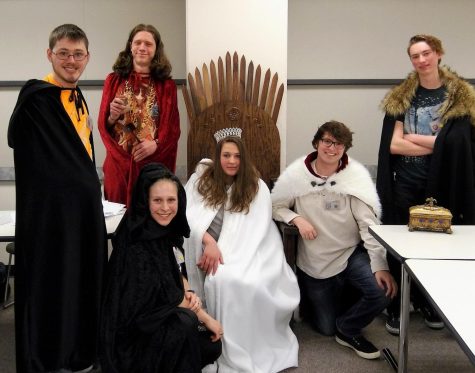
A royal court… before chaos descends. From left to right: (Hayden Jeffress) Baron Bonville, (Conner Posey) Lord Chancellor Archbishop of Canterbury, (Georgie Weissgerber) Duke of York, (Emma King) Queen Margaret, (Noah Meseck) Earl of Salisbury, and (Zachary Zimmerman) Duke of Exeter, the Constable of London.
Sitting in on the second session of the War of the Roses—the historical war that inspired George R. R. Martin’s Game of Thrones: A Song of Ice and Fire fantasy novel series, the books that have kept you gripped to the HBO television show for years—the tensions are already high.
The year is 1459. It’s high summer, and Parliament is in session to determine how to run a kingdom ruled by an increasingly erratic, unstable monarch. The previous Lord Protector of the Realm, the Duke of York, is an obvious choice—to himself and his compatriots.

Lord Shrewsbury accuses the Duke of York of being detrimental to the Kingdom while Parliamentary members look on. From left to right: (Georgie Weissgerber) Duke of York, (Noah Meseck) Earl of Salisbury, (Trent Orndorffer) Baron of Fauconberg, (Marc Wagoner) Earl of Warwick, and (Mary Baker) Lord Shrewsbury.
A mad lord has insulted King Henry VI, and been confined to the Tower of London; his fate is now announced to the members of Parliament—execution. A parchment confession, covered in the blood of the criminal is offered to those gathered.
A rogue poet has been penning insulting poems about Queen Margaret D’Anjou, arousing suspicion in the ranks of the gathered nobility. “Treason!” cries a noble. Who would risk their head for the sake of such petty offense?
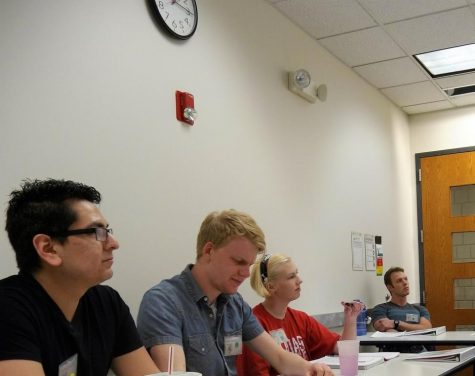
Nobles look on as motions are suggested for Parliamentary consideration. From left to right: (David Perez) Duke of Somerset, (Isaac Holm) Percy, Earl of Northumberland, (Ellie Mayer) Earl of Devon, (Scott Larson) Earl of March.
Baron Bonville and the Earl of Devon argue passionately, seeking to see one another deemed an ill of the Kingdom, to face further punishment. The Earl of Northumberland asks for aid against invading Scots, and a new title: Warden of the North. The Duke of Warwick desires reconciliation with Parliament for past crimes… only to wait until mere minutes before the governing body retires their session to declare that the Queen of England is a source of danger that must be dealt with.

Baron Bonville pleads with Parliament to punish the murderer of his friend, Nicholas Radford. From left to right: (Trent Orndorff) Baron of Fauconberg, (Marc Wagoner) Duke of Warwick, (Hayden Jeffress) Baron Bonville.
Astonished faces circle the Parliament—did this man just commit treason?
The professor and his assistant gamemaster occasionally interrupt on points of fact and to offer guidance.
“Know what you’re voting for,” warns Elijah Dicks, professor/gamemaster. “If you vote on something and can’t explain it… you’re going to have a bad time.”
As students file reluctantly out of the room, stripping themselves of crowns, heavy chains of office, fur-lined cloaks and counting their sterling silver and golden prestige coins, several linger to ask their gamemasters minor details about the historical figures they’re portraying, and to stand in quiet clusters with the other character actors they know and trust best to discuss the next session.
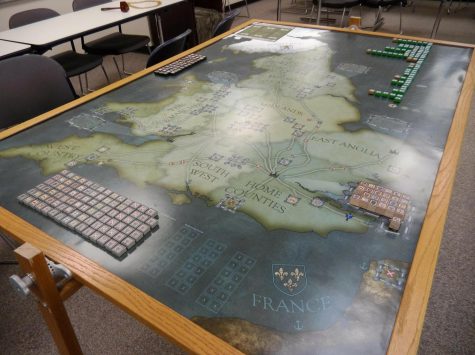
The Kingdom map, ready for battles to be fought and won… or lost.
After rolling the enormous map of counties, castles, ports and borders–with its movable military icons decorated for each noble and their levies–and carrying the fur-lined, carved throne back to the professor’s office to await the next session, I got to sit down with both Elijah and Johnny Pyrc, a student at ACC who is half of the creative force behind this historical live-action role-playing game.
“I started playing these games in grad school,” says Elijah. For the past five years, he’s been developing and running historical games for the ACC History Department. Some games, he’s taken from Reacting-to-the-Past scenarios designed at Columbia University: the French Revolution and the Crusades.
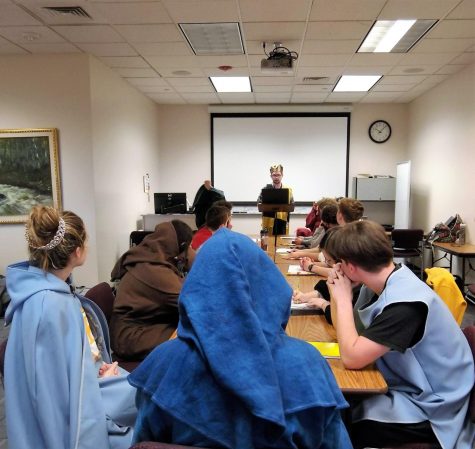
The Council of Acre discussing whether and where to launch the second Crusade, in History 101, The Crusades.
Johnny was a student in the Crusades game in Spring 2017.
“He absolutely crushed it,” says Elijah. The two started discussing game development after classes.
“[We discussed]… if you could make a game in any era, what would you choose?” recalls Johnny. Together, they landed on the War of the Roses, an historical event from the mid 1400s. They loved that this was the perfect scenario for students to engage with the heraldry, the pageantry and the conflict of a royal British court in a time of great upheaval.
The two took a summer and put together what today is the game component of History 111. Johnny calculates that the bulk of the work had been completed over the course of that summer; Elijah nods along—it was at most 5 months before they ran the first iteration in Fall 2017.
“I think it’s one of our best games,” muses Elijah. He explains that Johnny’s fresh perspectives, alongside a tradition of standing on the shoulders of giants allowed for a game to be designed from the ground up while skipping over typical pitfalls in the process.
“This is a lot like a medieval soap opera,” says Elijah with a laugh. There’s a reason George R. R. Martin chose the era himself. “The conflict comes built in.”
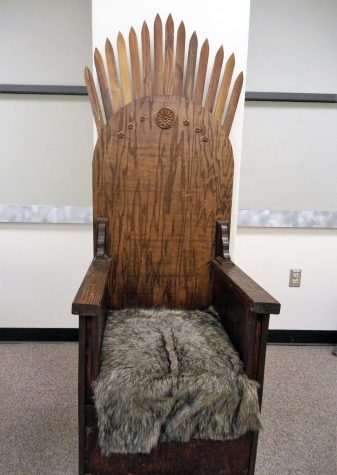
Who should sit in this chair?
The first half of the semester, students in HIS 111 learn about the formation of human civilization. Required reading? Battle Royal: The Wars of the Roses 1440-1462 by Hugh Bicheno, covering the first half of the War. Background information in hand and mind, students enter the second half of the semester primed to engage in conflict.
The game is designed around students throwing themselves into intense debate as well as the development and breaking of political alliances; slipping into subterfuge and even spying, perhaps ordering the occasional assassination attempt. The one sure thing? War.
“The biggest draw, I think… Game of Thrones really is based on this,” says Johnny. He points out that it’s such an intense game that tensions can grow dramatic very quickly. “When you see student’s faces going red? We love that,” he laughs.
“I think it’s so cool… this concept of feudalism, that [noblemen] owned their own land—people paid taxes to the Duke of York, they fought for him. It’s so cool to bring these historically powerful people into one room.”
Elijah jumps in, “It’s not the votes that count, it the Count that votes. See?”
Students can immediately see that the character they’re playing doesn’t have anywhere near as much money as another student’s character; two students of similar income may have vastly different levels of prestige.
Elijah points out, “It’s good representation that life really wasn’t fair. Some [noblemen] were even wealthier than the King.” Johnny nods, pointing out that at any time, these noblemen could withdraw and take their armies with them. “Or, [they] can leave Parliament and raise an army, banding together…”
War of the Roses isn’t the only game running at ACC, though it’s receiving the lion’s share of tweaking and changes given its novelty. Every game draws its students in, however. Watching any game in action, the viewer can see triumph, bitterness, genuine excitement and clear stress passing across the faces of the players. Also: relief, amusement and camaraderie.
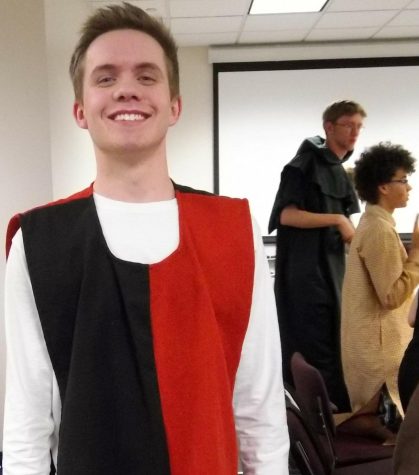
At another running game, The Crusades, there is less of a strategic outlay; this course is based on development of good arguments, debating well, and collaboration. There is no game board, nor are there open battles during class, but rather a reasoned debate between religious factions from across several borders.
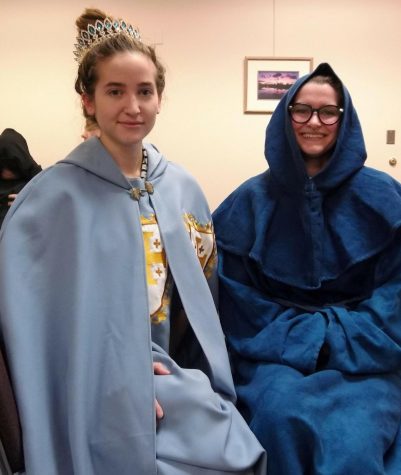
“To every time there is a season… a time for war, and a time for peace,” quotes a student in the effort to encourage a holy crusade. Several representatives of the Christian faith across Europe and the Eastern allies nod vigorously at the excerpt from Ecclesiastes; others watch the speaker, stone-faced. Is bloodshed really the answer?
The Muslim delegate prays for peace. Christians argue among themselves. But once the Council votes, there will be no turning back.
By a vote of 9-2, the Holy War will commence.
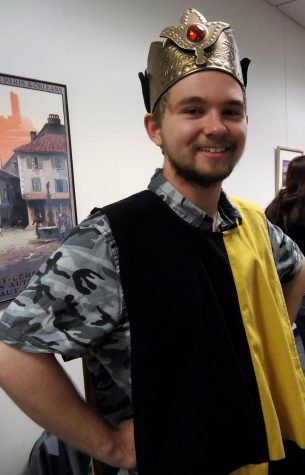
Alan Ivar plays King Conrad III in the council for the Crusades; big smiles after helping win the debate to go to war.
The principle behind the running of these games is simple: immersion. The introduction of so much competition and collaboration is extremely motivational to students. “We know the games work,” states Elijah plainly. “CCCS (Colorado Community College System) data supports the success of these games.” Their ultimate goal is to polish the game to the point it can be replicated and played smoothly at other schools.
Elijah and Johnny do like some tension in their players, though. Elijah brings up a quote from Game of Thrones apt to the students battling their way through a war of their own. As said by Hand of the Queen, Tyrion Lannister:
“Are you afraid? You should be. You’re in the great game now. And the great game is terrifying.”
But here at ACC, it’s also a lot of fun.
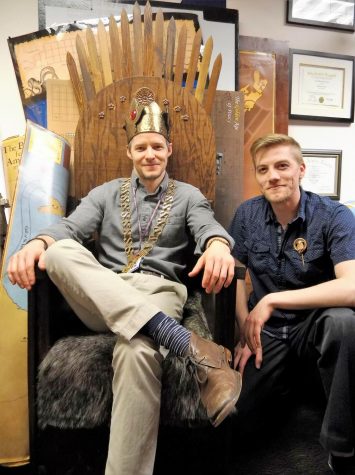
Elijah and Johnny can’t wait to stress you out.
Games and availability
~War of the Roses (HIS111) will be available in Fall semester 2018.
~The Crusades (HIS101) will be available in Fall semester 2018.
~Other games currently playing and/or with dates to be announced include: The French Revolution, The American Civil War, The American Revolutionary War, Henry VIII: Reformation of Parliament, The Golden Age of Piracy, and The Gilded Age Tycoons.

Kera is a touch neurotic and thinks all of you are fascinating from a distance. She's spent a lot of time studying psychology and the sciences. Writing, however, has decided it's tired of being relegated to the dark recesses of the...



